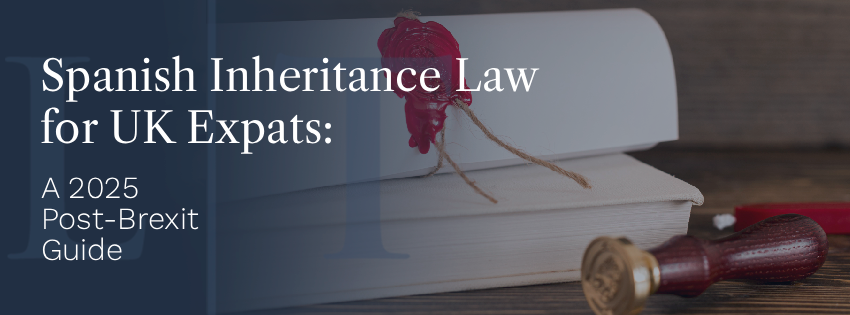In the post-Brexit landscape of 2025, understanding how to protect your assets in Spain is a primary concern for British nationals. The Spanish legal system, with its unique rules on inheritance, can seem complex and impenetrable.
At Lextax, we act as your expert legal translators. We don’t just explain the law; we provide clarity and a strategic path forward, ensuring your legacy in Spain is protected exactly as you wish.
Key Takeaways for UK Expats
- A Spanish Will is Essential: You cannot rely on a UK will alone for your Spanish assets.
- Elect UK Law: Your Spanish will must explicitly state your choice to use UK law to avoid Spain’s «forced heirship» rules.
- Heirs Pay the Tax: In Spain, inheritance tax is paid by the beneficiaries, not the estate.
- Regional Taxes Vary: Tax allowances differ significantly between autonomous communities. Professional advice is crucial to minimize the tax burden.
The Post-Brexit Reality: Why Action is Needed
As non-EU nationals, British expats are now automatically subject to Spanish national succession law unless they take proactive legal steps. While EU Regulation 650/2012 provides a vital tool—the ability to elect your home country’s law—this option is only available if it is unambiguously declared in a valid Spanish will. Without this declaration, you lose control over who inherits your Spanish estate.
Understanding Spanish Forced Heirship: A Common Point of Confusion
One of the greatest differences from UK law is «forced heirship» (sucesión forzosa). This is a frequent source of confusion, but the concept is straightforward once clarified. By default, Spanish law divides your estate into three parts:
- La Legítima (The Legitimate Third): Reserved by law for your children in equal shares.
- La Mejora (The «Improvement» Third): Must also go to your children, but you can distribute it unequally among them.
- Libre Disposición (The Freely Disposable Third): This is the only portion you can leave to anyone you wish—a spouse, a friend, or a charity.
This rigid structure is why electing UK law in your will is so powerful. It grants you the testamentary freedom you are used to.
(For a complete breakdown, consult our Complete Guide to Inheritance for Foreigners in Spain.)
How Inheritance Tax Works in Spain
Navigating inheritance tax (Impuesto de Sucesiones) is another complex area where professional guidance is indispensable. The key principles are:
- Paid by Heirs: Beneficiaries are responsible for filing and paying the tax.
- Based on Relationship & Value: The amount due depends on the value inherited and the heir’s relationship to the deceased.
- Crucially, Based on Region: Each autonomous community sets its own tax rates and allowances.
The differences can be immense. For example:
- In Andalusia and Madrid, exemptions for close relatives can reduce the tax liability by up to 99%.
- The Valencian Community and Catalonia have their own specific reductions and rules.
An expert can identify which regional regulations apply and ensure your heirs benefit from every available allowance.
(This planning is different from lifetime gifts. Read more in our article on Donations in Spain.)
Feeling overwhelmed by regional tax differences? You don’t have to be. Our experts can clarify your specific situation.
[Request a Tax Clarification]
Expanded FAQs: Your Questions Answered
What happens if a UK citizen dies in Spain without a will?
This situation, known as «intestacy,» creates significant cost, delay, and stress. Spanish law will determine who inherits your assets, applying the forced heirship rules by default. The process for your heirs becomes far more complicated and expensive.
Can my UK will be used in Spain?
While a UK will can be legally validated in Spain (a process called «probate»), it is slow, expensive, and complex. A Spanish will that specifically covers your Spanish assets is faster, cheaper, and ensures your election of UK law is immediately recognized.
How much is inheritance tax in Spain for a UK citizen?
There is no single answer, as it depends on the region, the value of the inheritance, and the heir’s relationship to you. It can range from nearly zero in regions with high exemptions for close family to a significant percentage for distant relatives or non-family members.
What is the difference between an inheritance and a lifetime gift (donación)?
An inheritance is a transfer after death (governed by Impuesto de Sucesiones). A donación is a gift made while you are alive (governed by Impuesto de Donaciones). Both are powerful estate planning tools with different tax implications that require a cohesive strategy.
Conclusion: From Complexity to Confidence
Navigating Spanish inheritance law post-Brexit doesn’t have to be a source of anxiety. With a proactive legal strategy guided by experts who specialize in simplifying complexity, you can achieve complete peace of mind.
At Lextax, we help British expats and property owners throughout Spain build a secure future.
Ready to secure your assets and protect your heirs? The first step is a clear conversation. Contact our expert team today for a personalized consultation.


